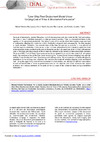Identificador persistente para citar o vincular este elemento:
https://accedacris.ulpgc.es/jspui/handle/10553/106983
| Campo DC | Valor | idioma |
|---|---|---|
| dc.contributor.author | Herrera Rodrigueza, Manuel | en_US |
| dc.contributor.author | Agrell, Per J. | en_US |
| dc.contributor.author | Manrique De Lara Peñate, Casiano | en_US |
| dc.contributor.author | Trujillo Castellano, Lourdes | en_US |
| dc.date.accessioned | 2021-04-23T13:16:09Z | - |
| dc.date.available | 2021-04-23T13:16:09Z | - |
| dc.date.issued | 2020 | en_US |
| dc.identifier.uri | https://accedacris.ulpgc.es/handle/10553/106983 | - |
| dc.description.abstract | Because of decreasing product lifecycles, cost of obsolescence and stock-outs for the final consumers, the value of time in maritime transport is under permanent scrutiny. Time is a determinant factor in the logistics of the globalized production. Any delay in one of the supply chain intermediate steps can lead to bottlenecks affecting the production and/or distribution of goods and consequently, the time needed to reach markets. Therefore, the consideration of the time perspective is essential to any attempt of maritime logistics modelling. In this paper, a liner ship fleet deployment (LSFD) model is applied to a set of transoceanic routes connecting the port of Shanghai, as the only departure point in China, with several ports of the East and West coasts of North America, simulating the weekly containerized traffic between China and USA. The US West Coast ports act as transshipment hubs via the intermodal US rail system and/or the maritime routes to the East coast traversing the Panama Canal. Several shipping lines operate both the Trans-Pacific and Trans-Canal routes with different ships. The rail system is included with specific adaptations to the railways cost structure. We calculate the trade-off between shipping costs and transit time. Using the opportunity cost of time estimated in other studies, we identify the optimal combination of cost and transit time in terms of generalized costs for the importer. Our model assesses the impact of delays from various problems in the ports of the US coast in the China-US trade using a bicriterion formulation. | en_US |
| dc.language | eng | en_US |
| dc.source | 21st International Working Seminar on Production Economics | en_US |
| dc.subject | 531212 Transportes y comunicaciones | en_US |
| dc.subject.other | Fleet deployment | en_US |
| dc.subject.other | Liner shipping | en_US |
| dc.subject.other | MIP | en_US |
| dc.subject.other | Railway traffic | en_US |
| dc.subject.other | Value of time | en_US |
| dc.title | Liner Ship Fleet Deployment Model Under Varying Cost of Time: A Bi-criterion Formulation | en_US |
| dc.type | info:eu-repo/semantics/conferenceobject | en_US |
| dc.type | ConferenceObject | en_US |
| dc.relation.conference | International Working Seminar on Production Economics 2020 | en_US |
| dc.investigacion | Ciencias Sociales y Jurídicas | en_US |
| dc.type2 | Actas de congresos | en_US |
| dc.utils.revision | Sí | en_US |
| dc.identifier.ulpgc | Sí | en_US |
| dc.contributor.buulpgc | BU-ECO | en_US |
| item.fulltext | Con texto completo | - |
| item.grantfulltext | open | - |
| crisitem.author.dept | GIR Economía, Comercio y Transporte Marítimo | - |
| crisitem.author.dept | Departamento de Análisis Económico Aplicado | - |
| crisitem.author.dept | GIR Economía, Comercio y Transporte Marítimo | - |
| crisitem.author.dept | Departamento de Análisis Económico Aplicado | - |
| crisitem.author.orcid | 0000-0003-0809-7823 | - |
| crisitem.author.orcid | 0000-0002-0918-5625 | - |
| crisitem.author.parentorg | Departamento de Análisis Económico Aplicado | - |
| crisitem.author.parentorg | Departamento de Análisis Económico Aplicado | - |
| crisitem.author.fullName | Manrique De Lara Peñate, Casiano Alberto | - |
| crisitem.author.fullName | Trujillo Castellano, Lourdes | - |
| crisitem.event.eventsstartdate | 24-02-2020 | - |
| crisitem.event.eventsenddate | 28-02-2020 | - |
| Colección: | Actas de congresos | |
Visitas
130
actualizado el 07-sep-2024
Descargas
32
actualizado el 07-sep-2024
Google ScholarTM
Verifica
Comparte
Exporta metadatos
Los elementos en ULPGC accedaCRIS están protegidos por derechos de autor con todos los derechos reservados, a menos que se indique lo contrario.
